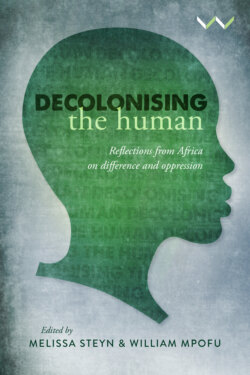Читать книгу Decolonising the Human - Группа авторов - Страница 16
На сайте Литреса книга снята с продажи.
Conclusion
ОглавлениеThis chapter has presented the history, discursive terrain, ideological productions and resistance initiatives that were meant to enable the re-membering of Africa, while at the same time highlighting how global imperial designs actively worked to undercut these struggles. Today the African Union speaks of a prosperous, united, self-defining and peaceful Africa in 2063 (AU 2015). One wonders whether by 2063 the global imperial designs, including their racist and patriarchal technologies, will have been broken and defeated. Reading David Theo Goldbergs' Are We all Postracial Yet? Debating Race reminded us that ‘Blackness has always been basic to racist definition, and remains so with postraciality’ (Goldberg 2015, 123). Goldberg elaborates on the problem of the constitution of blackism on a world scale:
Roughly, and in broad strokes, the earliest formulation and formation of racial subjects in the making of modern Europe included the Black, the Moor, and the Jew as non-Catholic and heathen interior aliens to be eliminated through conversion, expulsion, or extermination. New World Indians were established as exterior inferiors, savages of the state of nature. The Enlightenment largely produced Negroids, Mongoloids, Asiatics, and Caucasoids. The nineteenth century saw the identification of Negroes in more pernicious terms, and the state classification of Indians or Natives, with whites or Europeans as the driving category of domination. The twentieth century witnessed a proliferation of racial naming, and the hardening of demeaning, and deadly characterizations. As modes of racism came increasingly into question and societies grew more heterogeneous still, blackness stiffened into a variety of name-calling in different societies, each bearing comparable disparagement. (2015, 124–25)
It is within the context described by Goldberg that the question of blackism on a world scale becomes prominent and highly relevant today. At one level, the concept of blackism on a world scale challenges the claims of a post-racial world; at another level it reveals the failure of decolonisation and deimperialisation, as well as of the core claims of modern humanism and the human rights discourse that falsely assert a common humanity while obscuring the resilient forces of dismemberment. The key challenge, as noted by Goldberg (2015, 172), is how to ‘un-think racial configuration’ so as to enable a new humanism to emerge. Blackism on a world scale is less of an inherent identity than an invented condition created by racism. It will not come to an end until those conditions that are the grounds of its invention have disappeared.
